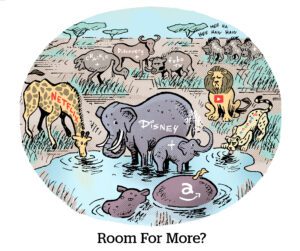Here’s today’s AdExchanger.com news round-up… Want it by email? Sign up here.
Yummy Data
For Yum Brands, owner of chains such as Pizza Hut, Taco Bell and KFC, the new “secret sauce” isn’t the sauce at all.
It’s cross-brand customer data.
Yum, yum, yum.
Joe Park, Yum’s new chief digital and technology officer, tells The Wall Street Journal that the fast-food company has an “AI-first mentality” enabled by data.
Not to be persnickety, but what Yum is doing is more like machine learning than AI. That’s not to pooh-pooh Yum’s accomplishment, however. It’s one of just a few non-tech companies (alongside chains like McDonald’s, Domino’s or Starbucks) with enough first-party data to really get a machine learning flywheel spinning.
The tangible value comes from investments in digital and consolidating data, which has improved customer profiles across the restaurant’s franchises. This, Park says, allows the company to target customers with effective and personalized deals, which helps increase the average order size and create repeat business.
Boosting loyalty is a major priority.
“Every time we grow that digital sales number,” Park says, “it comes with accompanying customer data.”
Alphabet’s New Favorite Letters: PE
Over the past couple of years, Google has brought far more financial rigor to its overall business – which is a jargony way to say it’s been pulling back on non-programmer jobs and service roles.
The moonshot factory for out-there product innovation? Buh-bye. Meanwhile, the ad platform has seen dramatic cutbacks to customer service and service-oriented roles, including marketing measurement. But for YouTube, perhaps most of all, the main focus has shifted away from services and toward software and APIs, The Information reports.
Rewind 10 years and Google was creating account-management-type roles for YouTube.
But those experiments concluded, and now YouTube is very clearly no longer in the creator management or agency services business.
YouTube is a video platform with a large audience, an advertising rev-share model and well-understood dynamics for video distribution.
In other words, YouTube is a business and must make tough choices, acknowledged Mark Rober, a former NASA engineer with a huge YouTube subscriber base, who was disgruntled by the sudden release of his account manager. And that’s especially true “when these more soft, relationship-type roles don’t have a direct correlation to the bottom line,” he said.
Talk about an attribution problem.
Another Conquester
Walmart Connect announced new updates to its DSP platform.
Some are pie-in-the-sky-type arrangements. For example, Walmart says it will now take bids from non-endemic brands, as in those not carried in its stores or online marketplace. There were also more run-of-the-mill announcements, including pilots for in-store campaign controls and shoppable video ads through partnerships with Roku and TikTok.
But one relatively minor update demonstrates how Walmart will approach advertising and data-related revenue as Connect grows – and that update is to allow conquesting in sponsored search listings, Ad Age reports.
When Walmart first launched its retail media business, it didn’t enable direct competitor conquesting. Neither did most other grocers when their shoppers started to move online.
Yet Google, Amazon and Apple are shameless, unrepentant monetizers of conquesting intent. Having to pay to protect your own keywords and brand name is just part of the game.
Still, this practice does fly in the face of customer intent, because people are searching for a particular item.
Enabling conquesting shows Walmart is becoming more responsive to demand overall and to yield on its platform, and less to its CPG shopper marketing vendors who will hate this change.
But Wait, There’s More!
Apple muscles in on subscription podcasts. [Semafor]
Why performance marketers are shifting their priorities to focus on branding and awareness building. [Digiday]
For data-guzzling AI companies, the internet is too small. [WSJ]
Disney’s struggling streaming business is at the center of its board proxy fight. [Bloomberg]
Generative AI search engine Perplexity has a plan to sell ads. [Adweek]
















